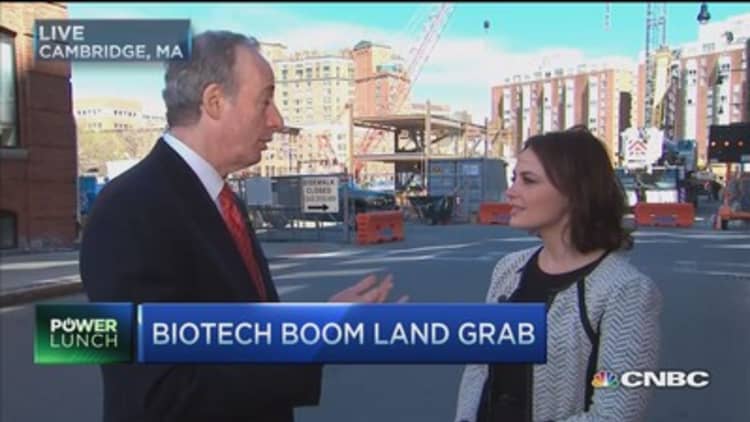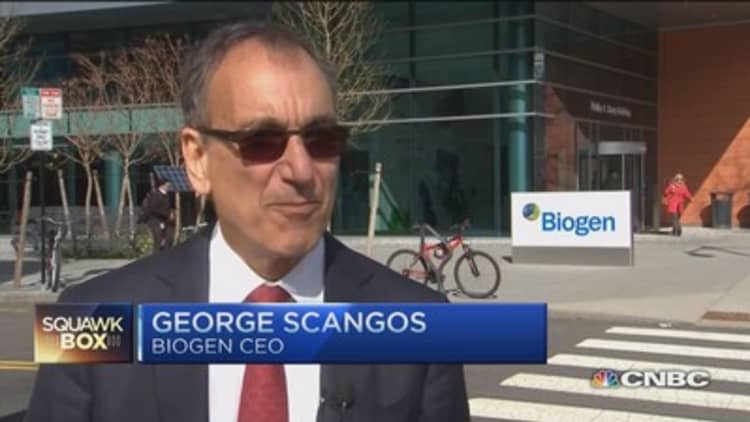


When George Scangos took the helm at biotech giant Biogen in 2010, he took a look around the company's headquarters in the Weston, Massachusetts, suburb of Boston and thought, "What are we doing out here?"
Last year, the company celebrated the return of its headquarters to Cambridge's Kendall Square, one of the capital cities of the biotechnology industry. The neighborhood's 2.5 square miles are home to 130 life sciences companies, according to industry group Massachusetts Biotechnology Council, the densest concentration on the planet.
"There's so much happening here in Kendall Square," Scangos said in an interview outside Biogen's new headquarters on Binney Street. "MIT is a two-minute walk from where we're standing now, Harvard is down the road, Mass General is a five-minute walk in the other direction. You can't go out to lunch or dinner without seeing people you know from those institutions. The level of excitement and interaction and vibrancy is quite amazing."
Read MoreWhy biotech IPOs are suddenly hot
And as biotech has boomed over the last few years—the Nasdaq biotech index has more than tripled in the last three—so has real estate in Kendall Square.
The neighborhood has been expanding rapidly to keep up. By year end, the capacity of commercial lab space will have increased by 25 percent since 2009, to more than 10 million square feet, according to Pete Abair, director of economic development and global affairs at MassBio.
Vacancy rates are at record lows, while rents have soared. For office space in Kendall Square, rents have doubled in the last decade, to more than $65 per square foot. Lab space is even tighter, with rents topping $71 per square foot on average, while the vacancy rate dropped to 3 percent in the first quarter, according to real estate firm Transwestern.
Read MoreThis wearable robot helps people walk
Space is at such a premium that biotech companies with plans to grow are taking early steps to secure access to space. Alnylam Pharmaceuticals this month negotiated a "right of first offer" arrangement with real estate firm BioMed Realty Trust to occupy the building at 500 Kendall Street that now houses Genzyme—three years from now. It also signed a deal to lease another 295,000 square feet next door in 2018.
"Our Alnylam 2020 goals are to have three commercial drugs on the market by 2020 with a pipeline of 10 products after that, many late-stage products, and an engine capable of filing two to three new drug entities, new INDs, a year across our three therapeutic areas," Alnylam President Barry Greene said in an interview at the company's headquarters on Third Street in Kendall Square.
The company currently doesn't have any products on the market; its most advanced compound, patisiran, is in the third and final stage of testing normally required before regulatory approval. With about 300 employees now, Alnylam plans to expand to more than 1,000 within five years.
"We needed the space to do it," Greene said. "When we thought about where to be, we didn't think twice that Kendall Square was where we wanted to be. So that was important for us to secure our future in the area and get long-term space."
Big pharma moves in
Both Biogen and Alnylam have ties to MIT through co-founder Phil Sharp, a Nobel Prize winner and MIT biologist. But more than just biotechs are moving in and expanding: Large pharmaceutical companies have been growing their footprint in the area as well.
Pfizer opened a 280,000-square-foot research hub in Kendall Square last year, housing 1,000 employees. Its landlord: MIT. Sanofi, Baxter, Novartis, Takeda and others also have major presences in the area.
"Of the top 20 pharmas I think probably somewhere between 50 and 75 percent have a presence in and around Cambridge," said Joel Marcus, CEO of Alexandria Real Estate, the landlord with the biggest market share in the area. "Most have presences and we have some folks who aren't there today who will be there over the coming months on the big pharma side."
Read MoreWhy do drugs have such weird names?
Rents in Cambridge, Marcus said, are likely to continue to rise at 10 percent to 15 percent per year, as any new open spaces continually draw wait lists several deep.
Compounding the squeeze, big technology companies have also been growing their presence in the area, from Google to Microsoft to Akamai.
"As tight as the lab market is in Kendall Square, the office market is even more tight, in part because Microsoft and Google are expanding their operations," MassBio's Abair said. At the same time though, he noted the proximity of tech and life sciences companies enable cross-industry collaboration.
Start-ups squeezed out
The soaring rents and tightening vacancy rates have some entrepreneurs worried about pressure on the ability of smaller start-ups to thrive in the neighborhood.
"This area is sort of becoming gentrified," said Michael Gilman, who is CEO of start-up Padlock Therapeutics and has worked in the Cambridge biotech industry for the last few decades. "All the sort of rich people are moving in and they're tearing things down and building up these fancy palaces. Everybody wants a footprint in Cambridge."
The consequence is less space and prices the little guys can't afford to pay, he said.
"I'm a little concerned that companies like us are getting sort of squeezed out," Gilman said.
Padlock is currently housed in the new offices of venture capital firm Atlas Venture, next to five other biotech start-ups—a different young company behind every door. It's a model that enables start-ups to be a part of the biotech ecosystem in Kendall Square, without breaking the bank.
"Right now we have six of those companies here ranging from autoimmune disease to cancer to Alzheimer's, all of them working here," Atlas partner Bruce Booth said in the firm's offices in Technology Square. There are "about two dozen entrepreneurs sort of co-habitating here with us in the office."
Padlock is operating on $23 million in Series A venture capital funding, Gilman said, and has started to look for its own lab space.
"To move into space of our own would represent a commitment today of like $3 million to $4 million, so it's a big chunk," Gilman said. "That buys a lot of chemistry. And so it is a challenge, and I'm hoping we don't have to go out to the suburbs because [of] the energy of this place."
—CNBC's Jodi Gralnick contributed to this report; chart by CNBC's Nicholas Wells

